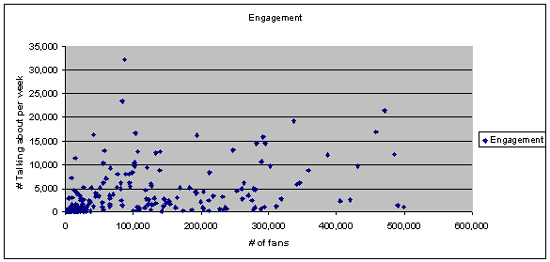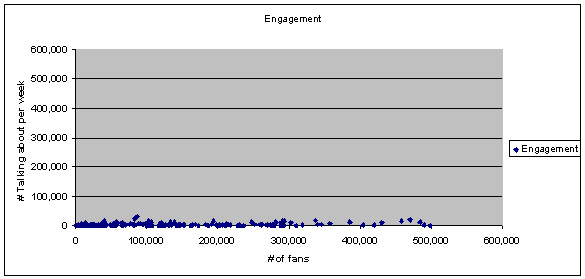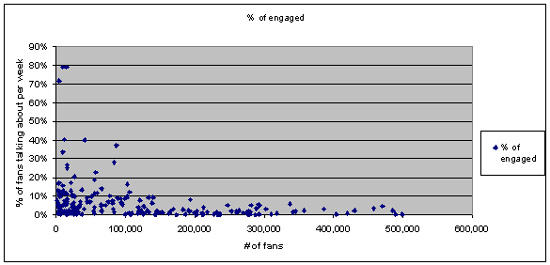Are you a social media/community manager who struggles to determine what a “good” Facebook page metric is?
It seems that the only number people are really looking at is “likes” – as if that means something really important in this day and age of Facebook algorithms, reach and “people talking about this”. It’s essentially like looking at Twitter follower numbers, but not how many replies or RTs an account gets… And we all know likes can be bought.
I’d noticed a trend for a while – that despite Facebook page growing like numbers, the “talking about this” number didn’t really climb, and the percentage of fans talking about the brand dropped!
So I decided to investigate. Here’s my very unscientific method:
I picked a range of pages, mostly from NZ and Australia and a few from the US that:
- had between 1,000 and 500,000 fans
- had posted in the last week
- were ‘official’ pages, not fan pages
and I cross-examined ‘likes’ with ‘people talking about this’. Here’s what I found:

Even as the number of fans grew, it was rare to see the “talking about this” figure go over 15,000. Here’s what the same data looks like when you change the scale:

It’s not that you’d expect a page of 500,000 fans to have 500,000 people talking about them – but why is it so low? Maybe if I had a bigger sample of pages sized 300-500k, I would have had more outliers.
Lets look at ‘talking about this’ as a percentage of fan numbers. I’d expect this to stay reasonably constant, but…

I know it’s difficult to infer from a small sample size, but maybe this is a trend – that when a page gets bigger than about 140,000 fans, engagement slips below 10%. I thought it might have something to do with people not wanting to have their say when a certain number of others are – the old “what’s the point of me saying something when 1,000 other people are”.
Is there are critical mass for Facebook conversations?
Some caveats:
- n=200
- Pages may have been running promotions and ad campaigns which skew the data
- Also note, I looked at many more pages that had <200,000 fans – simply because there is more of them.
- I am not a statistician and have not run any of this via a researcher. That doesn’t mean my data is bad: Just that I’m putting this out there as a thought starter.
</braindump>


Could it be that a brands ‘holy grail’ is a “large” number of fans (no specific number, but just that it should be big), and those brnads that have a large number become lazy? And as you say don’t push the engagement button, whereas those smaller fan number brand, keep their foot to the floor…
My experience would say that the larger the audience a brand has, there is no spike in engagement (talking about), which when you think of facebook’s algorithms and edgerank etc, should totally have an effect.
Maybe its just a team of people in some back room throwing darts at a wall…
I think with larger fan pages that a higher proportion of fans may have been ‘bought’ i.e. like-gated fan competitions, sponsored story etc. -They are possibly bigger brands with higher budgets to spend on Facebook advertising. This doesn’t mean that their true fans are less engaged with the brand – just that there is a higher percentage of ‘non-fans’ who have liked the page (for the purposes of a competition or prompted from a sponsored story etc.) and then never bothered to un-like it.
It would be interesting to compare the type of content posted – e.g. do the brands with 500,000+ fans actually deliver engaging content or do they just push their products / services. As an example the Subway page has 20M likes but they really just post in-store promotions, new subs etc. – a bit ho hum boring.
“what’s the point of me saying something when 1,000 other people are” – this is an interesting point – not one that I have thought of before but quite possibly the case.